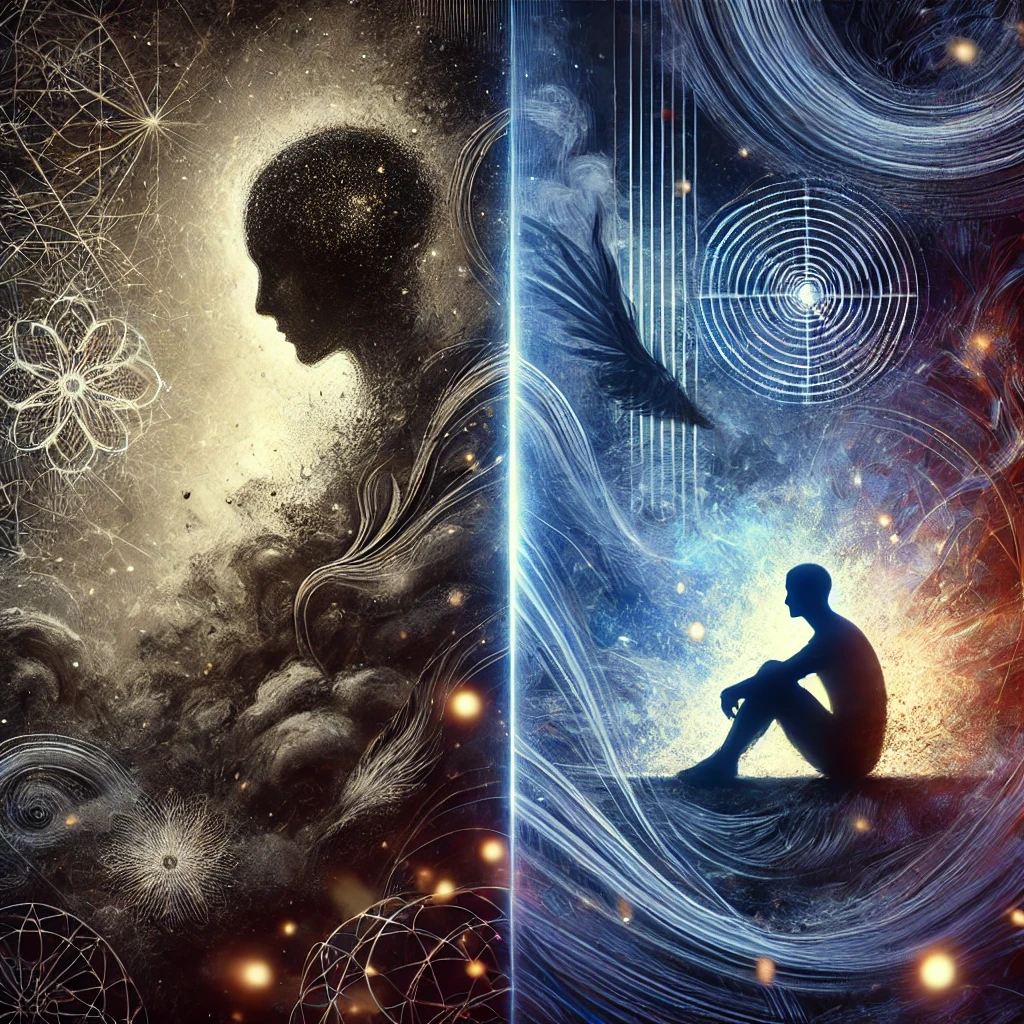Keeping a Nature Journal by Clare Walker Leslie is more than a drawing guide — it’s a soulful invitation to observe, reflect, and reconnect with the living world. Filled with inspiring sketches, accessible tips, and gentle wisdom, it turns simple moments outdoors into a contemplative practice. Ideal for those seeking a meaningful, creative habit rooted in nature and self-awareness.
What is a Dark Night of the Soul?

Introduction
In the previous few posts, we have been looking at existential crises. In this post, we will look to understand the differences between a dark night of the soul and an existential crisis.
Both involve profound questioning and introspection, but they stem from different origins and impact individuals in unique ways. Understanding these distinctions can help those experiencing these intense periods of doubt and confusion to find the appropriate support and strategies for coping. This post will delve into the differences between a dark night of the soul and an existential crisis, exploring their causes, symptoms, and resolution approaches.
What is a Dark Night of the Soul?
A dark night of the soul is a term often associated with spiritual or religious experiences. It refers to a period of deep spiritual desolation, loss, and inner turmoil. The term originated from the writings of St. John of the Cross, a 16th-century Spanish mystic and poet, who described it as a stage in the journey towards spiritual union with the divine.
Characteristics of a Dark Night of the Soul
- Spiritual Crisis:
- A profound spiritual struggle, often involving feelings of abandonment by a higher power.
- A deep sense of disconnection from one’s faith or spiritual beliefs.
- Loss of Meaning:
- A sense of emptiness and purposelessness in spiritual practices and beliefs.
- Feeling that previous spiritual experiences and practices no longer bring comfort or meaning.
- Intense Inner Turmoil:
- Deep emotional pain, sorrow, and despair.
- A feeling of being lost or in a void.
- Transformation and Renewal:
- Despite its painful nature, a dark night of the soul is often seen as a precursor to spiritual awakening and transformation.
- The process can lead to a deeper, more authentic connection with one’s spirituality or faith.
What is an Existential Crisis?
An existential crisis involves a period of intense self-examination and questioning about the meaning, purpose, and value of life. It is often driven by philosophical concerns and a desire to understand one’s place in the world. Existential crises are typically more secular in nature, although they can intersect with spiritual questions.
Characteristics of an Existential Crisis
- Philosophical Questioning:
- A deep inquiry into the meaning and purpose of life.
- Questions about personal identity, free will, and the nature of existence.
- Sense of Meaninglessness:
- Feeling that life lacks inherent purpose or value.
- Struggling with the notion of a universe that may be indifferent or chaotic.
- Anxiety and Depression:
- Feelings of deep anxiety, despair, and hopelessness.
- A sense of isolation and detachment from others.
- Search for Authenticity:
- The crisis often leads to a quest for a more authentic and fulfilling life.
- Encourages individuals to align their actions and values with their true selves.
Key Differences Between a Dark Night of the Soul and an Existential Crisis
- Source of Distress:
- Dark Night of the Soul: Primarily spiritual in nature, involving a deep sense of spiritual desolation and loss.
- Existential Crisis: Philosophical and psychological, centred on questions about life’s meaning and purpose.
- Focus of Questioning:
- Dark Night of the Soul: Focuses on one’s relationship with the divine or spiritual beliefs.
- Existential Crisis: Encompasses broader existential questions about identity, purpose, and the nature of existence.
- Emotional Experience:
- Dark Night of the Soul: Characterized by intense spiritual pain and a sense of divine abandonment.
- Existential Crisis: Marked by existential anxiety, depression, and a sense of meaninglessness.
- Outcome and Resolution:
- Dark Night of the Soul: Often leads to spiritual awakening, renewal, and a deeper connection with one’s faith or spirituality.
- Existential Crisis: Results in a quest for personal authenticity and a more meaningful and purposeful life.
Coping with a Dark Night of the Soul
- Spiritual Practices:
- Continue or adapt spiritual practices, even if they feel empty at the moment.
- Engage in prayer, meditation, or contemplation to seek solace and guidance.
- Seek Support:
- Talk to a spiritual advisor, mentor, or counsellor.
- Join a supportive community or group.
- Embrace the Process:
- Accept the dark night as a natural part of the spiritual journey.
- Trust that the process can lead to growth and transformation.
Coping with an Existential Crisis
- Philosophical Exploration:
- Read philosophical works that explore existential themes.
- Engage in discussions with others who are also questioning life’s big questions.
- Therapeutic Support:
- Seek therapy or counselling to explore and understand the crisis.
- Cognitive-behavioural therapy (CBT) and existential therapy can be particularly helpful.
- Reflect on Values and Goals:
- Identify core values and passions.
- Set meaningful and achievable goals that align with these values.
See also How to Understand and Navigate the Challenges of an Existential Crisis
Conclusion
While a dark night of the soul and an existential crisis share similarities in their intensity and the profound questioning they involve, they are distinct in their origins and focus. Understanding these differences can help individuals seek the appropriate support and strategies for navigating these challenging periods. Whether through spiritual practices, philosophical exploration, or therapeutic support, both experiences offer opportunities for deep personal growth and transformation.
Are you burnt out or having an existential crisis?

Introduction
In our fast-paced, demanding world, feelings of exhaustion and questioning your purpose can become overwhelming. However, it’s important to distinguish between burnout and an existential crisis, as they stem from different sources and require unique approaches for resolution. This post will explore the key differences between burnout and an existential crisis, their symptoms, causes, and ways to manage them.
What is Burnout?
Burnout is a state of emotional, physical, and mental exhaustion caused by prolonged and excessive stress. It occurs when you feel overwhelmed, emotionally drained, and unable to meet constant demands. As the stress continues, you begin to lose interest and motivation, leading to decreased productivity and a sense of hopelessness.
Causes of Burnout
Burnout is typically work-related but can also stem from other areas such as caregiving or chronic stress. Common causes include:
- Excessive Workload: Unmanageable workloads and long hours.
- Lack of Control: Feeling powerless over your job or responsibilities.
- Insufficient Rewards: Lack of recognition or rewards for your work.
- Poor Work-Life Balance: Neglecting personal life due to work demands.
- Unclear Job Expectations: Uncertainty about your role and responsibilities.
Symptoms of Burnout
Burnout manifests through various physical, emotional, and behavioural symptoms:
- Physical Symptoms: Chronic fatigue, insomnia, headaches, muscle pain.
- Emotional Symptoms: Feelings of failure, helplessness, detachment, cynicism.
- Behavioural Symptoms: Withdrawal from responsibilities, procrastination, using food, drugs, or alcohol to cope.
What is an Existential Crisis?
An existential crisis involves deep, often troubling questions about your purpose, values, and the meaning of life. Unlike burnout, which is rooted in external stressors, an existential crisis is more internal and philosophical, stemming from a need to understand your place in the world.
Causes of an Existential Crisis
An existential crisis can be triggered by various life events and changes, such as:
- Major Life Changes: Loss of a loved one, divorce, retirement.
- Personal Failures or Achievements: Questioning the value and meaning of your pursuits.
- Traumatic Experiences: Confronting mortality or significant suffering.
- Milestone Ages: Reaching significant ages like 30, 40, or 50.
Symptoms of an Existential Crisis
An existential crisis is characterized by profound introspection and emotional upheaval:
- Deep Anxiety and Depression: Persistent feelings of unease and hopelessness.
- Obsession with Death: Frequent thoughts about mortality.
- Sense of Meaninglessness: Feeling that life lacks purpose or direction.
- Isolation and Loneliness: Withdrawing due to feeling misunderstood or disconnected.
- Intense Self-Reflection: Constantly analysing and questioning beliefs and actions.
Key Differences Between Burnout and an Existential Crisis
- Root Cause:
- Burnout: Arises from external stressors, primarily related to work or responsibilities.
- Existential Crisis: Stems from internal questioning of life’s meaning and purpose.
- Focus of Distress:
- Burnout: Focused on specific areas of life, such as job or caregiving duties.
- Existential Crisis: Encompasses broader questions about existence and identity.
- Symptoms:
- Burnout: Physical exhaustion, emotional detachment, and decreased performance.
- Existential Crisis: Deep existential anxiety, philosophical questioning, and a sense of meaninglessness.
- Resolution Strategies:
- Burnout: Requires rest, stress management, and changes in workload or environment.
- Existential Crisis: Involves philosophical exploration, finding personal meaning, and often seeking support or therapy.
Managing Burnout and Existential Crisis
Managing Burnout
- Take Breaks: Ensure regular breaks and vacations to rest and recharge.
- Set Boundaries: Establish clear work-life boundaries to prevent overworking.
- Seek Support: Talk to a supervisor, seek counselling, or join a support group.
- Practice Self-Care: Engage in activities that promote physical and mental well-being.
Managing an Existential Crisis
- Embrace Uncertainty: Accept that it’s okay not to have all the answers.
- Seek Support: Discuss your feelings with trusted friends, family, or a therapist.
- Explore Philosophy: Read philosophical works to gain new perspectives.
- Reflect on Values: Consider what truly matters to you and what you want your life to represent.
Conclusion
While burnout and an existential crisis may share some overlapping symptoms, understanding their distinct causes and manifestations is crucial for effectively addressing them. Burnout is typically related to external stressors and requires practical steps to manage workload and stress. In contrast, an existential crisis is a profound internal struggle with life’s meaning, often needing deeper philosophical exploration and personal reflection. Recognizing the differences can help in seeking the appropriate support and strategies to navigate through these challenging experiences.
You may also be interested in our previous post about what an existential crisis is. Psychology Today has an insightful article on Are You Having an Existential Crisis?

